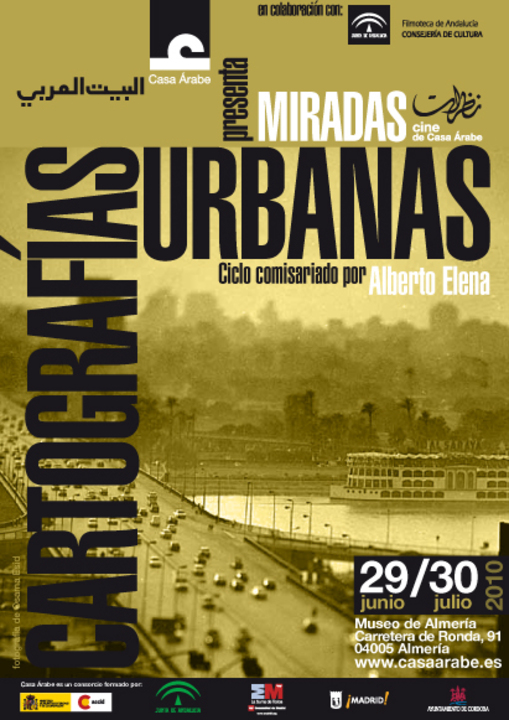Films
Index / Activities / Films / Urban Cartographies: the city in contemporary Arabic cinema
Urban Cartographies: the city in contemporary Arabic cinema
From June 22, 2010 until July 30, 2010
Casa Árabe will display in Almeria from June 29th to July 30th this season. Starting in June, it portrays the vision Arab filmmakers have on the city, as a place where desires, projects and hopes, dreams for anonymity and freedom can come true.
The films are based on cities such as Beirut, Casablanca, Cairo, Nouadhibou, and Jerusalem.
Awaiting Happiness, by Abderrahmane Sissako (Mauritania and France, 2002).
Nouadhibou. From the country interior, the young Abdallah visits his mother before migrating to Europe. Unable to understand the hassaniya language spoken over there, he is transformed into a real stranger in a world he observes with a mixture of distance and fascination.
Chronicle of a Disappearance, by Elia Suleiman (Palestine, 1996).
Jerusalem. A young Palestinian filmmaker returns from the United States to shoot a movie. The reunion with family and friends in Nazareth, and the close look at the way of life of Arabs in Israel, which he quit a long time ago, contrasts a feverish political fantasy with the city of Jerusalem as a background.
The Chaos?, by Youssef Chahine and Khaled Youssef (Egypt and France, 2007).
Cairo. Choubra neighborhood is subjugated to Hatem, a corrupted Police officer that everyone fears and hates. Just Nour, the young woman he courts, dares face him. Nevertheless, she is secretly in love with Sherif, a young and upright district attorney. An unrequited love in a social violence and police oppression environment.
WWW: What a Wonderful World, by Faouzi Bensaidi (Morocco, France and Germany, 2006).
Casablanca. Kamel is a killer who accepts jobs through the Internet. After carrying out his tasks, he is used to phoning Souad, an occasional prostitute. The one who always answers his calls is her friend Kenza, a young traffic officer to whose voice Kamel is deeply attracted, and he decides to search her after a certain point.
Falafel, by Michel Kammoun (Lebanon and France, 2006).
Beirut. Taufiq tries to make the most of every day. He realizes soon that having a normal life in Beirut is a luxury which is not available to him. Fifteen years after the end of the civil war, tensions are still all on edge, like a time bomb ready to explode. A long summer night will be crucial for his lifetime.
At the Filmoteca de Andalucía in Almeria, at 9.30 p.m.. Original version with Spanish subtitles.
Awaiting Happiness, by Abderrahmane Sissako (Mauritania and France, 2002).
Nouadhibou. From the country interior, the young Abdallah visits his mother before migrating to Europe. Unable to understand the hassaniya language spoken over there, he is transformed into a real stranger in a world he observes with a mixture of distance and fascination.
Chronicle of a Disappearance, by Elia Suleiman (Palestine, 1996).
Jerusalem. A young Palestinian filmmaker returns from the United States to shoot a movie. The reunion with family and friends in Nazareth, and the close look at the way of life of Arabs in Israel, which he quit a long time ago, contrasts a feverish political fantasy with the city of Jerusalem as a background.
The Chaos?, by Youssef Chahine and Khaled Youssef (Egypt and France, 2007).
Cairo. Choubra neighborhood is subjugated to Hatem, a corrupted Police officer that everyone fears and hates. Just Nour, the young woman he courts, dares face him. Nevertheless, she is secretly in love with Sherif, a young and upright district attorney. An unrequited love in a social violence and police oppression environment.
WWW: What a Wonderful World, by Faouzi Bensaidi (Morocco, France and Germany, 2006).
Casablanca. Kamel is a killer who accepts jobs through the Internet. After carrying out his tasks, he is used to phoning Souad, an occasional prostitute. The one who always answers his calls is her friend Kenza, a young traffic officer to whose voice Kamel is deeply attracted, and he decides to search her after a certain point.
Falafel, by Michel Kammoun (Lebanon and France, 2006).
Beirut. Taufiq tries to make the most of every day. He realizes soon that having a normal life in Beirut is a luxury which is not available to him. Fifteen years after the end of the civil war, tensions are still all on edge, like a time bomb ready to explode. A long summer night will be crucial for his lifetime.
At the Filmoteca de Andalucía in Almeria, at 9.30 p.m.. Original version with Spanish subtitles.

